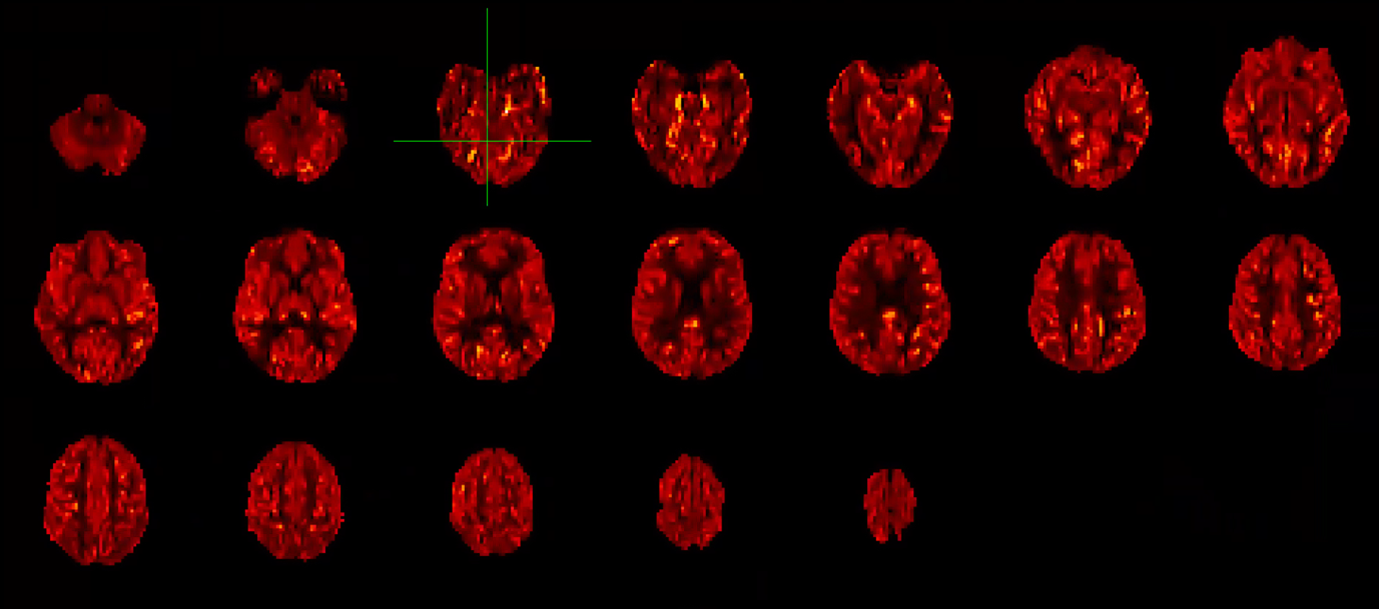State of the art MRI scanner to support research and teaching at UEA
By: Communications

UEA’s £3.7 million magnetic resonance imaging (MRI) centre opened in June 2021. Built with infrastructure funds from UEA, and grant funding from the Wellcome Trust and Wolfson Foundation, it is known as the UEA Wellcome Wolfson Brain Imaging Centre (UWWBIC). Its state-of-the-art 3 tesla whole-body MRI scanner can image all body parts, with particular focus on acquisition of neuroimaging data.
On a recent visit to the MRI scanner, pictured above, UEA Vice-Chancellor David Maguire said “The creation of UWWBIC marks a significant investment by UEA into the neurosciences and medical research, supporting scientists from across multiple faculties. Its location on campus, within the School of Psychology, provides a unique research and teaching environment which aims to support UEA’s researchers and students for years to come”.
The MRI is manufactured by Siemens, with whom UEA have a research agreement to support the development and use of cutting-edge pulse sequences and hardware. Pulse sequences are the software that is used to “drive” the MRI. One such sequence, obtained through collaboration with the University of Oxford (Professor Thomas Okell), temporarily applies a magnetic label to the blood, and subsequently tracks its passage into the brain.
 Caption: An image of blood perfusion in a healthy young adult acquired with UEA’s MRI scanner. Unlike conventional perfusion imaging, no radioactive tracers are required to produce these images, which show that the grey matter (e.g. the brighter “ribbon” around the edge of the brain) has higher perfusion that the white matter (located inside). This difference arises because the cells in grey matter have higher energy requirements than white matter, so need a greater supply of oxygen and glucose to function.
Caption: An image of blood perfusion in a healthy young adult acquired with UEA’s MRI scanner. Unlike conventional perfusion imaging, no radioactive tracers are required to produce these images, which show that the grey matter (e.g. the brighter “ribbon” around the edge of the brain) has higher perfusion that the white matter (located inside). This difference arises because the cells in grey matter have higher energy requirements than white matter, so need a greater supply of oxygen and glucose to function.
An exciting new study, being run by Professor Michael Hornberger, is using this arterial spin labelling pulse sequence to determine whether reductions in blood flow are related to cognitive decline, with particular focus on dementia.
Such studies are only possible thanks to the generous support of the Wellcome Trust and the Wolfson Foundation. Paul Ramsbottom, chief executive of the Wolfson Foundation, said: “We are delighted to see the UEA WWBIC flourishing and that the state-of-the-art 3 tesla whole-body MRI scanner has made so many important projects possible.”
Caption: Video tour of the facilities available in the School of Psychology, including the MRI and MRI-simulator. Our simulator allows people to discover what it’s like going into an MRI before having their scan, helping them acclimatise to the experience.
Access to UEA’s MRI scanner provides an incredible learning opportunity for students. For example, the School of Psychology offers the module “Practical Skills for MRI Research”, where Masters students are taught how to develop their own experiments measuring brain function, which they deliver on the MRI scanner and then analyse prior to presenting their results. A current student on the MSc in Cognitive Neuroscience, taking the imaging module, is supported through the Susan Marmor Memorial Scholarship made possible by a charitable donation by UEA alumnus Trevor.
Trevor decided to support a scholarship after hearing about a fellow graduate. “About a year ago I decided to Google the names of all those students I could remember from forty years ago at UEA. I was appalled to learn one of them had died of a brain tumour. It seemed fitting to remember her by donating a bursary in her memory to assist a post graduate student at UEA working on brain health.
“We came up to UEA and learned of the research being undertaken in the new MRI scanner. We learned that UEA are participants in the search for an effective treatment for Alzheimer’s. There is every reason to be hopeful for a therapy to be available quite soon which will slow the development of the disease considerably.”
Those interested in supporting world leading research being performed at UEA should contact Jonathan Brooks Associate Professor, Head of MRI UWWBIC, or Will Penny, Professor, Director of UWWBIC.